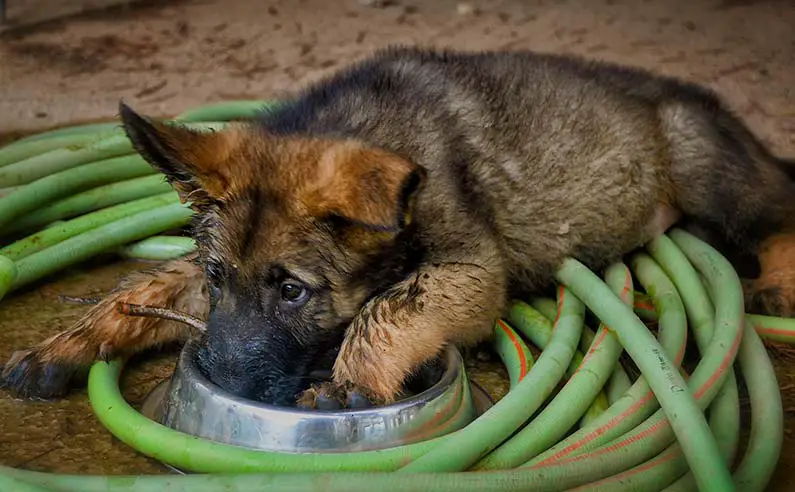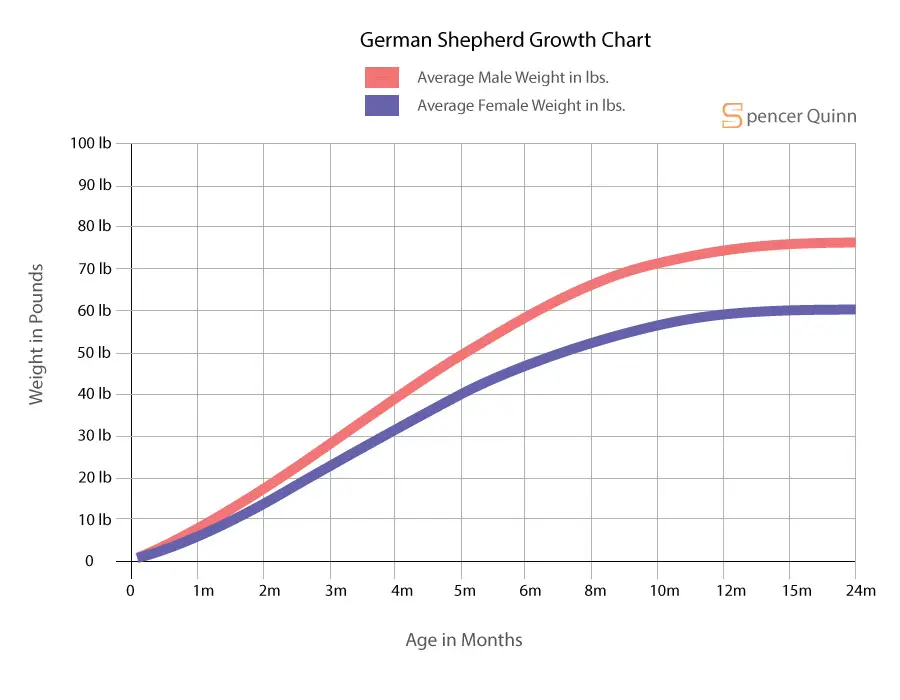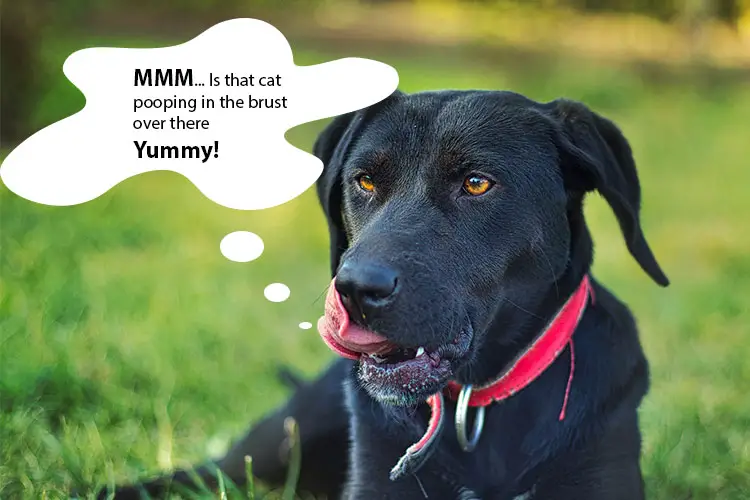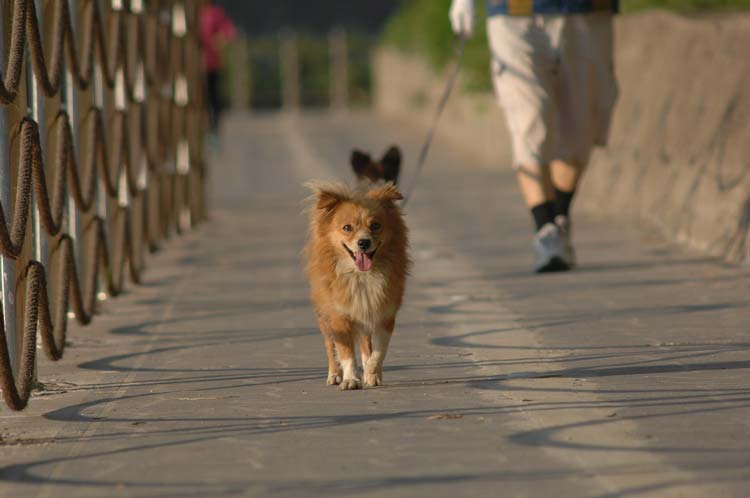
One of the most loved breeds around the world is the German Shepherd, which is classified as a medium to large breed by the AKC. They are commonly found in big families and therefore, they need quality meals and a healthy diet to keep them strong.
Every big dog starts as a small puppy. With that in mind: how much should you feed German Shepherd puppies and how often? To make matters simpler for you, we wrote this guide to help you find out the kind of food, the amount, and the other considerations when you are feeding your German Shepherd puppy to ensure that they are healthy and strong when they grow up.
The GSD is a loyal and obedient breed but with that kind of temperament comes a fair price – you should feed them with a healthy diet. There are so many food options out there, so which food is the best for your pup and how much should you feed them? During puppyhood, your German Shepherd pup should have varying amounts so that it matches their dietary needs per age milestone.
See also:
Page Contents
How much to feed a German Shepherd puppy?
For a German Shepherd puppy, you should feed about 2 to 3 cups of food a day, which is usually in the form of kibble (but wet food also works). The 2 to 3 cups of food should be divided equally in a day’s schedule, which is usually 3 times a day.
Of course, the cups of food in a day are still subjective to how many calories they are allowed to take to avoid obesity and other health issues. The number of times a day can be reduced to only 2 once they reach adulthood.
With that said, when you feed your puppy, look at the manufacturer’s guidelines and other information on the packaging of your chosen puppy food. Always make sure to check the label of your puppy food when it comes to serving size. It helps that you have an accurate measuring cup so that you will provide the right nutrition for your puppy.
So, how do you properly feed your puppy based on their age? A GSD puppy’s age milestones all have different recommended amounts of food so be sure to check out our guide below:
Birth to 2 weeks old
A GSD puppy during this stage is still reliant on being nursed so they shouldn’t be weaned yet. They begin to open their eyes and should be beside the mother and under their watchful eyes.
If your pup is in a big litter, make sure that all of them get equal chances of nursing. Supposed a puppy in a litter doesn’t reach the ideal weight, you can ask your vet about it and they will recommend a supplement to make them healthier. In the same way, if the mother GSD doesn’t have sufficient milk, your vet could also recommend a milk enhancer.
3 to 4 weeks old
A German Shepherd puppy that is 3 weeks old will still be nursed by their mother. That’s why you shouldn’t try to wean them yet during this time. However, they may become more active since they are learning to walk on their own.
Continue letting your German Shepherd pup be free-fed by their mother. They should still be close to each other and yet also have sufficient room for peeing within the quarters.
When your German Shepherd puppy reaches 4 weeks old, you can start the weaning process. That’s because they are a little bit more mature than when they were still 3 months old. The weaning process can be begun by using a mixture of 3:1 ratio of water and puppy food. Make sure that the puppy food is appropriate for their breed size.
With that said, don’t expect them to eat a lot of food yet. To avoid wasting the mixture, only put a little bit as a trial for them. Take out the food within 20 minutes if your pup didn’t touch it.
5 to 6 weeks old
Continue the weaning process that has been left off in the past week. When your German Shepherd pup turns 6 weeks old, they will be more interested in your mix if they hadn’t been responding well last week. During this time, your pup could still be nursing from their mother, so it’s okay if your pup didn’t finish all of their solid food trial pack.
Always remember that when weaning your German Shepherd puppy (or any puppy breed, for that matter), never force-feed them as it can only lead to problematic behaviors in adulthood. Instead, just let them feed freely without restrictions except for removing the food after 20 minutes of inactivity to keep it from going bad.
When your German Shepherd puppy reaches 6 weeks old, you can tone down the water content to only half of the bowl so that your puppy will feed more solid food. Always remember that weaning should be a gradual process and it will take a few days or so for your pup to get adjusted. Then, when your GSD pup easily gobbles down the food, you can eventually narrow down the water content to only 1/4.
7 to 8 weeks old
Don’t expect your German Shepherd puppy to be fully weaned yet in the 7th week since they could still be under a transition period. Nonetheless, you should continue to offer the puppy food mix. However, by this time, the German Shepherd pup should have no problem digesting pure kibble and should be free-fed for the meantime.
Meanwhile, they could still be nursed by the mother but only infrequently (and standing up). German Shepherd puppies, at this stage of their life, will develop their milk teeth.
By the 8th week, the German Shepherd puppy will most likely be fully weaned from their mother’s milk. This is when you can start scheduling their meals to only 3 times a day. The best amount of food that you should give to your German Shepherd puppy is at least 2 cups a day, which is divided into 3 meals.
If your German Shepherd pup likes to run a lot, that’s when you may need to increase the amount of food, such as up to 3 cups a day. Of course, if you notice that your pup is gaining too much weight, you can just stick to 2 cups a day.
9 to 10 weeks old
If you are a breeder, the German Shepherd puppy at 9 weeks of age can already be sent to a new home. Always recommend the new owner that if they need to feed their puppy a different brand of food, make sure that they do it gradually. This will cause less likelihood of any digestive problems that might occur if they suddenly get a new food shock.
As always, the German Shepherd pup should be fed 3 times a day and make sure to take out any uneaten food that might spoil eventually. It will also act as a disciplinary action so that your pup will only eat food when they are truly hungry.
By 10 weeks of age, the German Shepherd pup should still be fed 3 times a day. You can also increase the amount of daily food from 2 to 3 times a day because of the rapid growth spurt.
However, always be careful not to overfeed your German Shepherd puppy because obesity has a very bad effect on their bones. The GSD is a breed that’s prone to hip dysplasia so having a healthy weight plus foods rich in glucosamine will aid their development overall. A good rule of thumb is that when you see the puppy’s ribs as very defined, they need extra cups of food.
11 to 12 weeks old
The German Shepherd puppy will have a massive growth spurt in the 11th week so you might have to increase their food intake. Expect them to eat a lot so make sure you set scheduled meals as much as possible. If you cannot be there all the time, have someone watch over your dog or go for an automatic or scheduled feeder.
Also, keep small items off the ground since the German Shepherd will go through a rapid growth stage when they’ll start thinking of everything they see as food. By 12 weeks old, the GSD pup will still have a growth spurt so it can be difficult to balance their food intake. However, by the end of this week, their growth spurt will slow down.
13 to 14 weeks old
By the time your German Shepherd pup reaches 13 weeks of age, they will play around more often and might also begin to beg for food even when they’re not hungry. Don’t give in to this behavior and always keep their schedule as strict as possible.
A German Shepherd dog is meant to be slim due to being an athletic and active breed so you shouldn’t give them too much food to avoid overweight and even bloat problems.
A GSD pup that reaches 14 weeks of age will also begin to develop adult teeth so keeping the kibble and hard treats in stock at home is a good idea. Always stick to the 3-meal plan for your puppy’s daily schedule. By keeping them on a regular schedule, you’ll also easily predict when they need to do their business, which means less likelihood of “accidents”.
Feeding Schedule
To help you figure out the ideal feeding schedule for your GSD puppy, here’s a simple chart we put together:
| Birth to 3 weeks | Free-feeding |
| 4 to 7 weeks | 4 times a day |
| 8 weeks to 8 months | 3 times a day |
| 9 months and above | 2 times a day |
Note: the last meal should be a few hours before bedtime so that your puppy won’t wake up in the middle of the night just to go to the bathroom.
Meanwhile, here’s an ideal schedule on transitioning the GSD puppy’s diet plan per age:
| 16 weeks old and below | 1/2 to 1 cup |
| 16 weeks to 9 months old | 1 to 1 3/4 cups |
| 9 to 12 months old | 2 to 2 1/2 cups |
| 12 months old and above | 2 1/2 to 3 1/2 cups |
Growth Chart
To help you understand the growth of your GSD puppy, here’s a nifty chart that will help you figure out the ideal weight per age milestone. You can use this as a guide to keeping your puppy healthy and away from weight issues:
| Age in months | Male Weight | Female Weight |
|---|---|---|
| 1 month | 8 lbs (3.6 kg) | 6 lbs (2.7 kg) |
| 2 months | 16 lbs (7 kg) | 14 lbs (6.3 kg) |
| 3 months | 28 lbs (13 kg) | 24 lbs (11 kg) |
| 4 months | 40 lbs (18 kg) | 32 lbs (14.5 kg) |
| 5 months | 50 lbs (22 kg) | 41 lbs (18.5 kg) |
| 6 months | 57 lbs (26 kg) | 46 lbs (21 kg) |
| 8 months | 68 lbs (31 kg) | 55 lbs (25 kg) |
| 10 months | 72 lbs (32 kg) | 57 lbs (26 kg) |
| 12 months | 75 lbs (34 kg) | 58 lbs (26.5 kg) |
| 15 months | 76 lbs (34.5 kg) | 59 lbs (27 kg) |
| 24 months | 77 lbs (35 kg) | 60 lbs (27.5 kg) |

In general, your German Shepherd puppy should be around 50 to 68 pounds (female) or 71 to 86 pounds (male) by 12 months of age and above.
Recommended Food
A German Shepherd puppy can be fed with the following:
1. Raw food
Most pet owners will tell you that raw feeding is the best for dogs and puppies. That’s because most commercial brands do have fillers and are, therefore, not that nutritional for your puppy. That’s when the popularity of homemade raw food for puppies became common.
However, if you do want to try raw feeding for your pup, be sure to consult your vet as to which foods are the best to feed them. Fortunately, there are many freeze-dried foods for puppies and dogs out there in the market.
2. Kibble diets
Unfortunately, a GSD puppy is prone to canine dilated cardiomyopathy or DCM so your vet might advise you to lessen the grain-free foods that include peas and potatoes instead of grains. However, you can ask your vet which kibble diet is best for them without ruining their health due to all the fillers.
3. Foods with glucosamine
Glucosamine is an important nutrient that GSD puppies deserve to keep them away from hip dysplasia. Examples of glucosamine sources are chicken feet, oxtail, shellfish, beef trachea and knucklebones, and various seafood.
Foods to Avoid
As with most dogs, a German Shepherd puppy should not be fed with the following:
- Chocolate
- Salt (in moderate amounts)
- Alcohol
- Nuts (walnuts and macadamia)
- Wild mushrooms
- Avocados
- Grapes
- Xylitol (artificial sweeteners)
- Green tomatoes
- Onions and leeks
- Garlic
- Raw potatoes

FAQs on Feeding a German Shepherd Puppy
So, you might be wondering about a couple of fast facts when feeding your German Shepherd – we have some of them right here:
When should I switch my German Shepherd to adult food?
The best time to switch your GSD puppy’s food to adult food is around 16 weeks or 4 months of age. If you don’t feel like they are ready, you can extend this up to 1 year or so, depending on the weaning process that they went through.
Help! My puppy is still hungry! What should I do?
If your German Shepherd puppy doesn’t stop eating, here are some methods you can try:
- Try increasing the frequency of feedings from 3 to 4 times a day but lessen the amount per serving.
- Consider low-calorie treats during training to avoid feeling hungry too much.
- Vary your weekly meal plan for your dog so they don’t always look for the same kind of food (and it will lessen their picky-eating tendencies).
How do I choose food for my German Shepherd puppy?
When choosing German Shepherd puppy food, you should consider the following factors first:
1. Quality meat
Having quality meat means your puppy food comes from reputable farms and sources, such as grass-fed cows and cage-free chickens. This also includes wild-caught fish. Protein sources are important for your canine friend so they have to come from quality sources.
Avoid meat that has unknown origins. Always buy meat or dog food in which certain specified meat is the first ingredient. Among the most common meat sources for puppies include chicken, beef, bison, fish, lamb, and turkey. However, you should consult your vet if you have concerns for food allergies should your pup develop some (or if you suspect it so).
2. Free from fillers
When you choose the best puppy food for your pet, as much as possible, look for little to no fillers such as corn or soy. Unfortunately, most brands of dog food in the grocery store contain fillers because they make the product cheap in terms of production. They aren’t of any nutritional value to your pup so you should choose another brand instead. There are many other options online that don’t have such fillers and instead, contain veggies such as peas and carrots.
3. A healthy blend of nutrients
Protein is good for your growing pup but a balanced mix of nutrients is better. Talk to your vet for any nutritional deficiency of your pet and consider adding more of the certain nutrient to your pet’s daily meal.
A good rule of thumb is to have a healthy mix of meat, veggies, and fruits that are safe for your dog or puppy’s consumption. Consider brands that have more than just protein but also fats – but not too much. Certain amounts of fiber and probiotics are also good for pups, especially if they have sensitive tummies.
4. No animal by-products
Animal by-products come from various unknown resources, such as roadkill meat, dead animals, expired meat from grocery stores, animal intestines, chicken beak, ground bones, and the like. No one wants to feed their puppy with those!
To avoid your pup getting sick or digestive upsets, always make sure to avoid such brands of dog food that have by-products since you will never know where they came from (and whether they are from healthy or sick animals).
My puppy won’t eat. What should I do?
It can be worrying to see your GSD not have any appetite for anything. If your German Shepherd is a little on the timid side of eating, here’s what you can do:
- Consider dog-safe seasonings to make the food bowl more flavor
- Mix both kibble and wet food so it’s both crunchy and flavorful
- Try swapping to a different food brand (but use a gradual transition)
- Consult your vet if the puppy hasn’t been eating for more than 2 meals and looks sick
Raw feeding a German Shepherd puppy
Raw feeding is usually okay for a GSD puppy but makes sure to consult your vet first on what’s the best puppy food for them that’s safe. After all, their immune system is still not as strong as that of an adult dog. This leads to possibilities of bacterial infection (hopefully not).
Be sure to choose your raw foods carefully and handle them with care. Make sure that they are also balanced in terms of protein and other nutrients. Make note of certain vitamins and minerals that your vet advised.
Slow-feeding a German Shepherd puppy
The GSD puppy is going to be prone to bloat so you’ll have to think of ways to lessen their food intake. The most common way to do it is to buy your puppy a slow-feeder bowl or a puzzle feeder. This slows down their munching so that they won’t likely develop bloating.
Aside from that, slow feeding is also a way to lessen your GSD puppy’s likelihood of obesity. During their crucial development years, it pays to invest in slow-feeders since they could be voracious eaters as part of the medium-to-large breed family.
Conclusion
To wrap it up, a German Shepherd is a big dog but they should start with quality food and scheduled feedings to keep them healthy. Remember that weaning is not a quick process and should be done with utmost patience. Ultimately, your German Shepherd puppy will thank you in the future once you’ve raised them with great care in terms of feeding.














